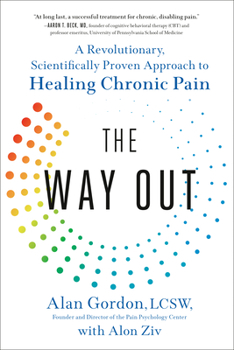The Way Out: A Revolutionary, Scientifically Proven Approach to Healing Chronic Pain
Select Format
Select Condition 
Book Overview
A groundbreaking mind-body protocol to heal chronic pain, backed by new research. Chronic pain is an epidemic. Fifty million Americans struggle with back pain, headaches, or some other pain that resists all treatment. Desperate pain sufferers are told again and again that there is no cure for chronic pain. Alan Gordon, a psychotherapist and the founder of the Pain Psychology Center in Los Angeles, was in grad school when he started experiencing chronic pain and it completely derailed his life. He saw multiple doctors and received many diagnoses, but none of the medical treatments helped. Frustrated with conventional pain management, he developed Pain Reprocessing Therapy (PRT), a mind-body protocol that eliminated his own chronic pain and has transformed the lives of thousands of his patients. PRT is rooted in neuroscience, which has shown that while chronic pain feels like it's coming from the body, in most cases it's generated by misfiring pain circuits in the brain. PRT is a system of psychological techniques that rewires the brain to break out of the cycle of chronic pain. The University of Colorado-Boulder recently conducted a large randomized controlled study on PRT, and the results are remarkable. By the end of the study, the majority of patients were pain-free or nearly pain-free. What's more, these dramatic changes held up over time. The Way Out brings PRT to readers. It combines accessible science with a concrete, step-by-step plan to teach sufferers how to heal their own chronic pain.
Format:Paperback
Language:English
ISBN:0593086856
ISBN13:9780593086858
Release Date:August 2022
Publisher:Avery Publishing Group
Length:224 Pages
Weight:0.55 lbs.
Dimensions:0.6" x 5.6" x 8.2"
Customer Reviews
1 rating
Changed my life
Published by Mel , 8 months ago
This is a good book for those with chronic pain. For 10 years, I lived with an 8/10 pain level. My entire life got smaller and smaller, it destroyed my career. I was chronically not wanting to go on (if you know what I mean). My life was in shambles. I found one doctor that would listen to me, who referred me to an excellent integrative medicine and pain doctor and she gave me this book.
In addition to neuroplastic pain (what is usually referred to as fibromyalgia), I have a couple other health problems that cause pain. It was the original health problems that caused the original pain which then triggered my neuroplastic pain. This book drastically reduced my pain and improved my quality of life.
The book uses Pain Reprocessing Therapy, based on Action and Commitment Therapy (ACT), to help decrease pain. This book isn't magic, I had to do the work to get to where I'm at. And like anything, you have to keep working it to stay well. I had a family crisis come up and I didn't work the program, some of my pain came back. Part of that is because it was still pretty early in the process. It is really common for people to stop doing what they did to get well once they are well. And the Neuropathways for pain have been well worn for many years. This book covers what to do when there is a relapse of pain. I, also, got into physical therapy to address my other health conditions that cause pain, which helped to decrease that pain.
If you are tired of being in pain and are willing to do the work necessary, this book may be helpful. I found the book well written and easy to follow. There is nice humor in the book. Alan Gordon originally developed this process to help his own pain, that's why I think this book is so accessable. Mr. Gordon has the training and background to develop this process, which pairs nicely with his deep and intimate knowledge of neuroplastic pain.






